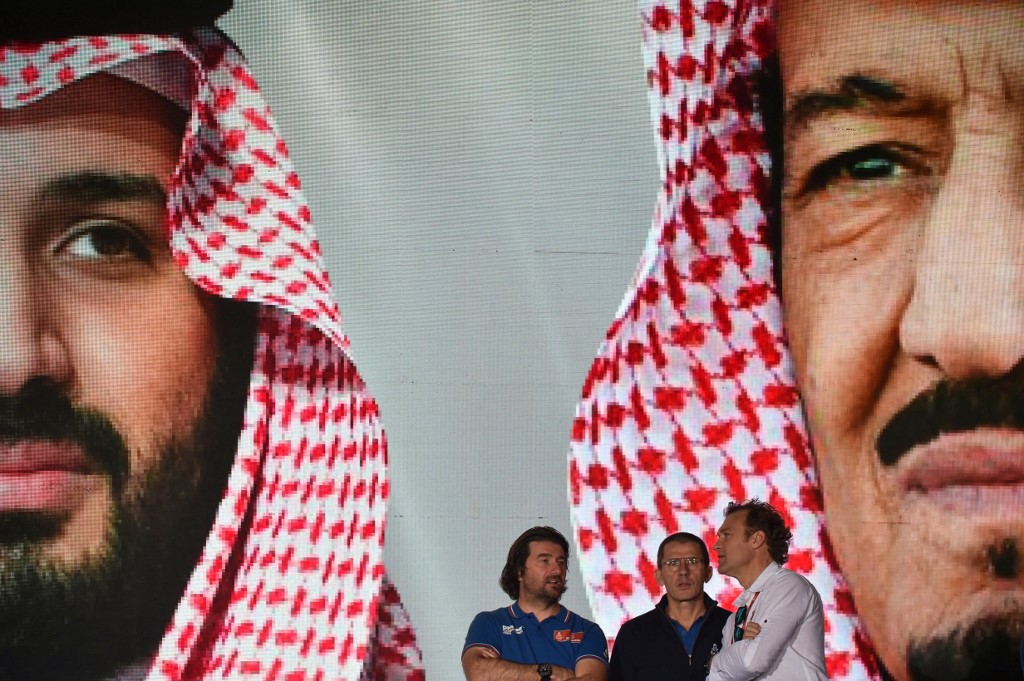Dakar Rally: Sports fans must speak up against Saudi Arabia's 'sportswashing'

Since the ascension of Saudi Crown Prince Mohammed bin Salman in 2017, tremendous resources have been invested into public relations efforts to polish Saudi Arabia’s image.
Saudi authorities have been going to great lengths, bringing celebrities and influencers to music festivals, and hosting an ever-increasing number of large-scale sporting events.
Last July, the Saudi General Sports Authority (GSA) announced that it was investing $650m to boost the sector, in line with the country’s Vision 2030 development strategy, aimed at addressing the country’s heavy reliance on oil revenues. Riyadh has also been heavily lobbying sports bodies all over the world, seeking to secure more hosting contracts.
Crackdown on free speech
In December, the “Clash on the Dunes” boxing rematch between Andy Ruiz Jr and Anthony Joshua sparked outrage from human rights groups, which said it was being used to “sportswash” rights abuses, including Riyadh’s crackdown on free speech and the surveillance and hacking of activists.
Stay informed with MEE's newsletters
Sign up to get the latest alerts, insights and analysis, starting with Turkey Unpacked
Responding to such accusations, the GSA’s chairman stated that while mistakes had been made in the past, the country was making progress on human rights. Commenting on the financial loss his country was incurring by hosting the fight, he said that “social change has no price”.
In recent years, the scale of repression of dissenting voices has reached unprecedented levels
While the government has taken several measures aimed at presenting Saudi Arabia in a more progressive and modern light - including lifting a driving ban and travel restrictions for women - those who have been advocating change continue to languish in prison.
In recent years, the scale of repression of dissenting voices has reached unprecedented levels, with dozens of human rights defenders arrested, tortured and put on trial, along with journalists and critics.
Women’s rights activists have also been targeted and several remain in detention, including Loujain al-Hathloul and Samar Badawi, who campaigned for women’s right to drive and an end to the male guardianship system.
Repressive climate
Now, from 5-17 January - and for the next five to 10 years - Saudi Arabia will host its biggest sporting event thus far, the famous Dakar Rally. Ahead of the desert race, more than a dozen human rights organisations urged event organisers, France’s Amaury Sport Organisation, to adopt a human rights policy to ensure that sporting events do not contribute to human rights abuses, denouncing the repressive climate prevailing in the country.
“The ability of civil society to operate where you hold or participate in sports events is essential to upholding your credibility and avoiding any contribution or linkage to human rights violations,” the groups noted.
In fact, civil society is virtually non-existent in the country: the Saudi Association for Civil and Political Rights, which celebrated its 10th anniversary in 2019, has been banned since 2013, and all its members have been prosecuted on charges related to their activism.
Last November, Dakar director David Castera said there was hesitation before the selection of Saudi Arabia for the rally, citing “many guarantees” from the country, without going into detail. Castera also noted that the Dakar was not the first sporting event to be held in Saudi Arabia; indeed, international normalisation is alive and well.
In the coming months, the country will host the Spanish football Super Cup, a cycling tour, a women’s European golf tour and the Saudi Cup, the world’s richest horse race.
GSA chairman Prince Abdulaziz bin Turki al-Faisal says that accusations of “sportswashing” are contradictory, since his country was always criticised for “not opening up to the world”, but now faces negativity for doing so. Yet, there will be no transformation of Saudi Arabia at the expense of the fundamental rights and freedoms of its citizens. Change must be rooted in an inclusive society where citizens can speak their mind without fear of arrest, torture or death.
Raising awareness
Because of economic and geopolitical interests, Saudi authorities are able to act with impunity, as too many states shy away from condemning gross human rights abuses, including the humanitarian crisis in Yemen, and the lack of accountability for the gruesome murder of journalist Jamal Khashoggi. Saudi Arabia assuming the G20 presidency is further evidence of the country’s international rehabilitation.
But realpolitik does not mean that nothing can be done, and the hosting of sporting events in Saudi Arabia also provides opportunities. Where states have failed to stand up for rights and freedoms, competitors, broadcasters and journalists attending these events can use their voices to raise awareness of the alarming state of human rights in the country.
In that spirit, NGOs are calling on the Dakar Rally community to stand with four women’s rights champions - Hathloul, Badawi, Nassima al-Sadah and Nouf Abdulaziz - who remain behind bars for their peaceful activism: “We are asking Dakar Rally participants to help increase awareness and show solidarity by wearing a #StandWithSaudiHeroes pink armband during the event.”
These activists, and countless others, have paid the price of their freedom for the state’s “social change” narrative. Competitors and sports fans must speak up, as silence allows Riyadh’s soft power tactics to wash away human rights abuses, shutting down the voices of Saudi human rights defenders.
The views expressed in this article belong to the author and do not necessarily reflect the editorial policy of Middle East Eye.
Middle East Eye delivers independent and unrivalled coverage and analysis of the Middle East, North Africa and beyond. To learn more about republishing this content and the associated fees, please fill out this form. More about MEE can be found here.







